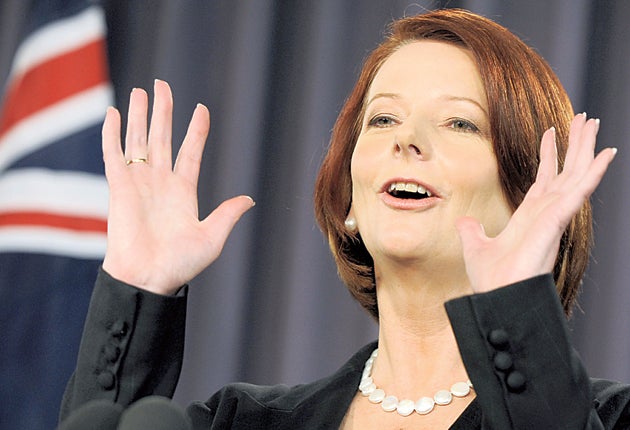Australia faces the prospect of first hung parliament since 1940

The Australian opposition leader, Tony Abbott, is a keen triathlete who rarely shuns a physical challenge. Yesterday he set himself a new endurance test: to campaign for 36 hours straight in a last-ditch attempt to win government in tomorrow's federal election.
With opinion polls, political pundits and bookmakers predicting the closest contest for decades, both Mr Abbott and the Prime Minister, Julia Gillard, are keenly aware that every vote counts. In the run-up to polling day, both have been blitzing the marginal seats in Queensland and Sydney that will almost certainly determine the election outcome.
While the polls are predicting a narrow majority for Ms Gillard's Labor Party nationally, they also indicate swings to the conservative Liberal-National Party Coalition in key marginals. Analysts say there is a real chance that Australia could end up with its first hung parliament since 1940.
Equally, the Coalition could still snatch victory from Ms Gillard's grasp – a prospect that galvanised Mr Abbott into going without sleep last night. Instead, he planned to give overnight radio interviews, then visit some shopping centres in the small hours to chat to shelf stackers.
"I am determined to meet as many Australians as I possibly can... [and] give the Australian people the best possible chance to change a really bad government," he said. "People expect the candidate for the top job to be keen. This time is too precious to waste."
For her part, Welsh-born Ms Gillard used the penultimate day of the five-week campaign to produce one of her final electoral carrots: two weeks' paid leave for new fathers. She also declared that Labor represented "political leadership offering the right judgement, the better plan and real vision".
With Labor and the Coalition vying for the middle ground, the campaign has produced no great policy surprises. Both parties have promised to return the budget to surplus by 2013. Labor will impose a new tax on the mining industry and will set up a new high-speed national broadband network.
Mr Abbott's main obstacle to power seems to be himself. While the 52-year-old has run a disciplined campaign, many Australians feel he lacks the gravitas to be prime minister. Not unlike the British Tories after they lost power in 1997, the Coalition – toppled in 2007 after 11 years in government – needs the right leader. Mr Abbott is the fourth in less than three years.
Labor has well-publicised leadership problems, too. Kevin Rudd, who ousted John Howard at the last election, was dumped by his own party after trailing in the polls. Ms Gillard, 48, has been Prime Minister for less than two months. It remains to be seen to what extent Labor voters punish her for stabbing Mr Rudd in the back.
The opposition needs to gain 17 seats to win a majority in the House of Representatives, the lower house: a swing of just 2.3 per cent. The Coalition or Labor could end up forming a minority government with the support of one or more of three independent MPs expected to be re-elected. The Greens could also win a federal lower house seat for the first time.
In the Senate, the upper house, the Greens are forecast to hold the balance of power for the first time. That could mean interesting times ahead, since both major parties have been dragging their feet on climate change.
Join our commenting forum
Join thought-provoking conversations, follow other Independent readers and see their replies
Comments
Bookmark popover
Removed from bookmarks